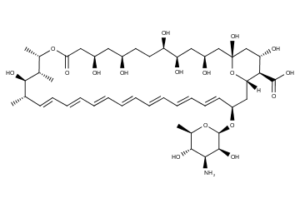Amphotericin B CAS NO 1397-89-3 Inquire about Amphotericin B
Tecoland supplies Amphotericin B bulk active pharmaceutical ingredient (API) to the pharmaceutical industry. Our Amphotericin B is manufactured by cGMP compliant facility. Welcome to contact us for further details including current DMF status for the product and up to date regulatory status of the manufacturing facility. We look forward to assisting you with your research and development projects.
What is Amphotericin B?
Amphotericin B is an antifungal medication that fights infections caused by fungus.
Amphotericin B is used to treat serious, life-threatening fungal infections. It is not for use in treating a minor fungal infection such as a yeast infection of the mouth, esophagus, or vagina.
Amphotericin B may also be used for purposes not listed in this medication guide.
Important Information
amphotericin B is for serious, life-threatening fungal infections. It is not for use in treating a minor fungal infection (yeast infection) of the mouth, esophagus, or vagina.
Do not use amphotericin B in larger amounts than recommended. An overdose can cause death.
Before taking this medicine
You should not receive this medicine if you are allergic to any formulation of amphotericin B (Abelcet, AmBisome, Amphocin, Amphotec, or Fungizone).
To make sure amphotericin B is safe for you, tell your doctor if you have:
- heart disease;
- diabetes;
- kidney disease;
- an electrolyte imbalance (such as low levels of potassium or magnesium in your blood);
- if you are receiving blood transfusions; or
- if you are receiving radiation treatments.
Amphotericin B is not expected to harm an unborn baby. Tell your doctor if you are pregnant or plan to become pregnant during treatment.
It is not known whether amphotericin B passes into breast milk or if it could harm a nursing baby. You should not breast-feed while using this medicine.
How is amphotericin B given?
Amphotericin B is injected into a vein through an IV. A healthcare provider will give you this injection.
The medicine must be given slowly through an IV infusion, and can take from 2 to 6 hours to complete.
Tell your caregivers if you feel any burning, pain, or swelling around the IV needle when amphotericin B is injected.
Amphotericin B may need to be given for up to several weeks or months, depending on the infection being treated.
While receiving amphotericin B, you may need frequent blood tests.
Use amphotericin B for the full prescribed length of time. Your symptoms may improve before the infection is completely cleared. Skipping doses may also increase your risk of further infection that is resistant to antifungal medicine. Amphotericin B will not treat a viral infection such as the common cold or flu.
What happens if I miss a dose?
Call your doctor for instructions if you miss an appointment for your amphotericin B injection.
What happens if I overdose?
Seek emergency medical attention or call the Poison Help line at 1-800-222-1222. An overdose of amphotericin B can be fatal.
What should I avoid while receiving amphotericin B?
Follow your doctor’s instructions about any restrictions on food, beverages, or activity.
Amphotericin B side effects
Get emergency medical help if you have signs of an allergic reaction: hives; wheezing, difficult breathing; swelling of your face, lips, tongue, or throat.
Call your doctor at once if you have:
- pale skin, easy bruising;
- blood in your stools;
- a light-headed feeling, like you might pass out;
- seizure (convulsions);
- jaundice (yellowing of the skin or eyes);
- build-up of fluid in your lungs–anxiety, sweating, gasping for breath, cough with foamy mucus, chest pain, fast or uneven heart rate;
- signs of a kidney problem–little or no urination; painful or difficult urination; swelling in your feet or ankles; feeling tired or short of breath;
- low potassium–confusion, uneven heart rate, extreme thirst, increased urination, leg discomfort, muscle weakness or limp feeling; or
- signs of new infection–fever, chills, flu symptoms, mouth and throat ulcers, rapid and shallow breathing.
Common side effects may include:
- nausea, vomiting, stomach pain, diarrhea;
- upset stomach, loss of appetite;
- muscle or joint pain;
- headache, ringing in your ears;
- pain, bruising, or swelling where the medicine was injected;
- weight loss; or
- flushing (warmth, redness, or tingly feeling).
What other drugs will affect amphotericin B?
Other drugs may interact with amphotericin B, including prescription and over-the-counter medicines, vitamins, and herbal products. Tell each of your health care providers about all medicines you use now and any medicine you start or stop using.
Disclaimer:
Information on this page is provided for general information purposes. You should not make a clinical treatment decision based on information contained in this page without consulting other references including the package insert of the drug, textbooks and where relevant, expert opinion. We cannot be held responsible for any errors you make in administering drugs mentioned on this page, nor for use of any erroneous information contained on this page.
External Link
- Amphotericin B. (n.d.). Drugs.Com. https://www.drugs.com/mtm/amphotericin-b.html
- Amphotericin B, https://en.wikipedia.org/w/index.php?title=Amphotericin_B&oldid=991527084